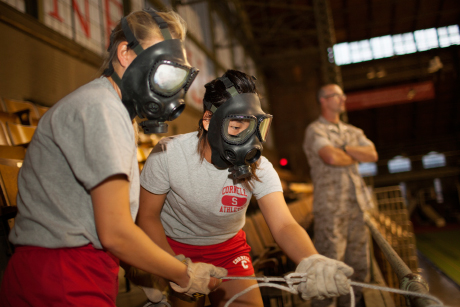Marines lead Cornell athletes through 'friction points'
By H. Roger Segelken

Moving dimpled little balls across a manicured green – or fuzzy larger ones over the net – was never like this.
Try transporting assorted heavy objects through the upper reaches of Barton Hall while a teammate mumbles, “Why don’t we [garbled] the dummy first?” through a military-issue gas mask, under direction of a Marine colonel and a war-hardened gunnery sergeant, with time running out.
Such are the leadership, problem-solving, communication and team-building challenges Cornell varsity athletes are getting lately. This morning it’s the women’s tennis and men’s golf teams, called to the cavernous old drill hall by Marines Lt. Col. Craig W. Wiggers, a Navy ROTC instructor, and his aide, Gunnery Sgt. Scott Hemenway.
“First take two laps around the track to get your heart rate up,” Wiggers suggests, arranging gear the athletes will soon wrangle with little more than a length of tangle-prone rope: four radial tires, two 25-pound weightlifting plates and a realistically weighted human dummy.
On The Hill and beyond
The Big Red Leadership Institute aims to empower student-athletes to confidently assume roles as teammates and team leaders for the betterment of their Big Red teams, their Cornell communities and their lives beyond The Hill. The institute engages more than 300 athletes – freshmen through team captains – in a coordinated leadership development curriculum set within the context of athletics but intended for broader personal development.
“We’ve put nine teams through this so far as part of the Big Red Leadership Institute,” Wiggers notes. “This is a focused leadership and problem-solving exercise, designed to take athletes out of their comfort zone and encourage them to think and work differently. Success is getting through points of friction – and learning to communicate and delegate,” Wiggers adds.
Tennis coach Mike Stevens launches into a pep talk: “You guys are all incredibly smart people. You’re all great at some things, and you all need to get better at some things. Combine that all together, and you’re one incredible team.”
Then they are off, with one mixed team of golfers and tennis players scrambling to the roof of Barton Hall’s blockhouse – tires and weight plates, rope and the dummy in tow – and the second team assembling on a nearby stand of bleachers. Team one’s first tactic is to throw the rope across a gap to waiting athletes in the bleachers. They decide to thread the rope through each item, and – assisted by gravity – hope the items will slide downhill to the receiving team.
That works, more or less. But two new challenges arise in the second phase: The gap between the next set of bleachers is much wider, and the bleachers are the same height; there will be no help from downhill rope and gravity this time.
Make that three challenges: At the colonel’s direction, everyone dons full-face gas masks. Suddenly, speaking to nearby teammates is hampered – and futile to the distant team. “I am speaking up! Why don’t you [indistinct] understand?”
The sending team has trouble throwing the rope to the other side, becoming more frustrated with each failed attempt. Gas masks fog up. “Make the rope [m-m-mph] into a ball!” “No, make a coil and throw [garbled] higher.” The rope becomes a tangled, sprawling knot of sisal.
As the Barton Hall clock nears 8 a.m., Wiggers mercifully calls the exercise to a halt and returns the teammates to their coaches for debriefing: What are the lessons we learned today, to better prepare for traditional athletic competition?
Inspired by an untraditional comment from the Marine sergeant (“Sometimes you don’t want to challenge authority – but you really do need to voice your opinion,” Hemenway offers), tennis captain Dena Tanenbaum opines: “We learned, just because you’re not the captain, just because you’re not a certain title, there will be times when you have to step into that leadership role. When you see something, don’t be afraid to say it. Don’t think, ‘I’m only a freshman so I can’t say a thing.’”
So much for friction points. Been there, done that and heading off to class with a renewed sense of confidence.
Media Contact
Get Cornell news delivered right to your inbox.
Subscribe